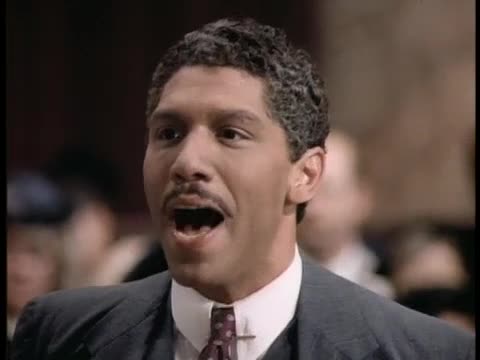Teachers' Domain; Civil Rights; Simple Justice: Marshall's Closing Statement

- Transcript
Now you're honest. I got the feeling listening here yesterday that when you put a white child in a school with colored children. That child is going to fall apart. And we all know that this is not true. And those same kids. In South Carolina. In Virginia. They play in the streets. Together. They play on the farms. Together. They go down the road. Together. And they separate to go to school. They come out of school and they play ball together. But they must be separated. In school. There is some. Magic too. This court has said that black and white I'm titled to vote together to
live in the same housing developments you have said. Let them attend the same university. Law school. Nursing school. But if they attend the same elementary and high schools. The world. Will fall apart. And yesterday Mr. Davis said that he feared. The only thing needed Rosewell after. Was Presti. Status. Exactly correct. We do want that and why shouldn't we. Why should our being black. Deny us what others in this country take for granted. Has this country fought a tragic. Bloody civil war all.
Over the question of Allah's status and not one. But three amendments to the Constitution. Were passed in the wake of that war. To settle the question of ah status once and for all. The Fourteenth Amendment. Specifically promise. Equal status. It was a Negro Bill of Rights. What had been left out. Of our Constitution had finally been put in. Otherwise extraordinary Constitution was finally complete. No longer would we be denied the right to be free to take charge of own lives to become a proud. And inspiring people. But we all know. That some states made a mockery.
Of those. Sacred promises. And in 1896. The Supreme Court of the United States said. That's all right. The Plessy decision was and is a fraud. Nothing more than a license to discriminate. To potential weight the inequalities and injustices of slavery. And now is the time for this court to say that is not what our Constitution stands for. The only way this court. Can decide for the defendants is to say. Negroes are inferior to all other human be. And nobody will stand up in this court and urge that.
Openly. Before a court in this country today to deny that enforced racial segregation is a badge of inferiority why. They are shutting their eyes as judges. To what they must surely know. As men. If this court denies our appeal. That is the message you will be sending. To us. And to the world. Thank you.
- Series
- Teachers' Domain
- Program
- Civil Rights
- Producing Organization
- WGBH Educational Foundation
- Contributing Organization
- WGBH (Boston, Massachusetts)
- AAPB ID
- cpb-aacip/15-fn10p0wz5v
If you have more information about this item than what is given here, or if you have concerns about this record, we want to know! Contact us, indicating the AAPB ID (cpb-aacip/15-fn10p0wz5v).
- Description
- Description
- This segment from American Experience: "Simple Justice" reenacts Thurgood Marshall's closing statement in Brown v. Board of Education.
- Description
- See related asset "osi04_vid_marshall_Backgrounder.xml"
- Description
- How did Marshall use the everyday experiences of black children and white children in the South to argue against segregation in public schools?Why did Marshall call Plessy a fraud? Do you think he was right? Why or why not?
- Description
- In this video segment, NAACP attorney Thurgood Marshall summarizes the reasons why the Supreme Court should outlaw segregation in public education. Brown v. Board of Education would become the most important civil rights case of the twentieth century. Also available from the "Simple Justice" series: A Handful of LawyersSocial Science EvidenceThe Trial BeginsArguing the Fourteenth AmendmentJustice Warren Reads the Decision
- Topics
- Social Issues
- Subjects
- civil rights movement :: historical figure :: Thurgood Marshall; civil rights :: segregation; civil rights :: segregation :: schools :: public schools; society :: citizenship :: rights :: equality :: education; society :: citizenship :: rights :: equal opportunity; society :: citizenship :: rights :: individual :: protection; society :: government :: laws :: promote justice; society :: government :: U.S. Supreme Court :: cases :: Brown v. Board of Education; society :: government :: U.S. Supreme Court :: cases :: Plessy v. Ferguson; society :: social change; society :: values and principles; civil rights movement :: group :: civil rights lawyers; social studies; Civil Rights and Civil Liberties
- Rights
- Rights Note:Streaming only,Rights:,Rights Credit:1993 New Images Productions. Directed by: Helaine Head. To purchase Simple Justice, please visit www.newimagesprod.com.,Rights Type:All,Rights Coverage:,Rights Holder:WGBH Educational Foundation
- Media type
- Moving Image
- Duration
- 00:05:32
- Credits
-
-
Producing Organization: WGBH Educational Foundation
Publisher: Teachers' Domain
- AAPB Contributor Holdings
-
WGBH
Identifier: 1efb188c2ce5f5dabea3e6aa6cfde96625bb1291 (ArtesiaDAM UOI_ID)
Format: video/quicktime
Color: Color
Duration: 00:03:32
If you have a copy of this asset and would like us to add it to our catalog, please contact us.
- Citations
- Chicago: “Teachers' Domain; Civil Rights; Simple Justice: Marshall's Closing Statement,” WGBH, American Archive of Public Broadcasting (GBH and the Library of Congress), Boston, MA and Washington, DC, accessed July 6, 2025, http://americanarchive.org/catalog/cpb-aacip-15-fn10p0wz5v.
- MLA: “Teachers' Domain; Civil Rights; Simple Justice: Marshall's Closing Statement.” WGBH, American Archive of Public Broadcasting (GBH and the Library of Congress), Boston, MA and Washington, DC. Web. July 6, 2025. <http://americanarchive.org/catalog/cpb-aacip-15-fn10p0wz5v>.
- APA: Teachers' Domain; Civil Rights; Simple Justice: Marshall's Closing Statement. Boston, MA: WGBH, American Archive of Public Broadcasting (GBH and the Library of Congress), Boston, MA and Washington, DC. Retrieved from http://americanarchive.org/catalog/cpb-aacip-15-fn10p0wz5v